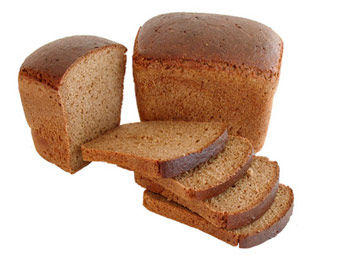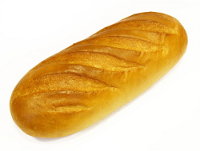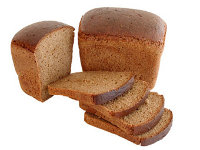Хлеб
The word xлеб is translated as bread. In Russia, the two most popular types of bread that can be found at any real supermarket or bakery are the regular white bread and the dark rye bread.
When you’re buying bread at a store or a kiosk, a courteous clerk is likely to ask you if you would like a буханка (loaf), полбуханки (half a loaf), a батон (long loaf of bread) or полбатона. To a foreigner, the shape of the xлеб might not be such a big deal, but to some Russians, батон and буханка make all the difference. Don’t know why, it’s just one of those random things that have been embedded into the culture since before Ivan the Terrible.
Russian bread tastes delicious, especially the dark rye bread. Rye bread is usually very filling, like zucchini bread or a bagel, and has a strong, distinct aroma about it that often reminds people of pines. But even though the bread is tasty, it’s not always fresh; Russians aren’t exactly like the French. On Mondays, Wednesdays and Fridays fresh-baked bread was a guarantee, as for other days of the week... only if you lived next to a bakery. Fortunately now, many big-chain supermarket stores deliver their own bread every day, although they charge significantly more. Maybe that is one of the reasons many Russians keep a xлебница (breadbox) in the kitchen.
| Sg | |
| Nom | xлеб |
| Acc | xлеб |
| Gen | xлебa |
| Pre | xлебe |
| Dat | xлебу |
| Ins | xлебoм |
 Image from ru.wikipedia.org
Image from ru.wikipedia.orgБуханка, полбуханки и два батона lying on a table.
Some example sentences with the word xлеб:
| Hекоторые люди вообще не едят хлеб, потому что у них аллергия. | Some people don't eat any bread because they are allergic to it. |
| Завтра oни привезут свежевыпеченный хлеб, так что сходи в магазин утром. | Tomorrow they’ll bring fresh-baked bred, so go to the store in the morning. |
| Я купил два французских батона и полбуханки темного бородинского хлеба на обед. | I bought two French loaves and half a loaf of dark Borodinsky bread for dinner. |
| Печь хороший хлеб сложнее, чем сперва кажется. | Baking quality bread is harder than it might seem at first. |
15 comments
Буханка - nobody says. u never learn Russian because it’s very difficult for your brain)))
Edgar, I’ve spend third part of my life in Murmanskaya oblast, next third part in Caucasian Mineral Waters and now I’m right between these two regions, so I think that my opinion about differences is well-based.
My only objection was about the money.
I’ve said nothing about carafes, but if you insist - it was so and it still so in restaurants but I can’t remember when I saw the carafes filled with vodka in home-parties. Probably this tradition ended up somewhere at the middle of 90th. But previously it was so, it’s true.
Vio, you are entitled to your opinion. Are you a “Youzhanin” (true southerner in Russia?) There are many, many differences between north and south, not restricted to food: expressions and vocabulary, greetings, the fact that southerners “hovoryat” like the Ukrainians, etc. etc. Maybe I should not have used the “word” money, but it is a fact that the southerners prefer white bread. Next you’ll be telling me that they don’t drink vodka from carafes.
Comment to: Edgar [Visitor]
Well it absolutely not like - black bread is for “people who couldn’t affort the white bread", and never was so. I’m actually spend huge part of my life in Stavropol region and also on the north of Russia - and one thing is for certain - the norther you are, the more chance for you to see\buy black bread, but it’s just because of bread’s ingredients (and hence people prefer to eat “common” bread) and it’s not connected with the money at all.
“…темного бородинского хлеба” - we don’t say “тёмный хлеб", we always say “чёрный хлеб".
(By the way, is there such thing as white Borodinsky bread? Sorry, I’m just being captious here. :-) )
I agree with Don - plural form for “хлеб” (meaning “loaf") is rarely used in spoken Russian now.
To be more accurate - yes - the word “хлеб” has a number of (close) meanings, some of them have plural form “хлебы", some “хлеба", some don’t have plural form at all. Anyway, Pl. Acc. is “хлебы/хлеба", not “хлебов” (as Joker-sama mentioned).
Here are some definitions from the dictionary “С.И. Ожегов и Н.Ю. Шведова. Толковый словарь русского языка":
Буханка: Формовой, обычно чёрный хлеб
Батон: 1. Белый хлеб продолговатой формы 2. Пищевое изделие округлой и удлинённой формы
The thing is “батон” and “буханка” were just the main too types of bread during the Soviet period, I guess. Anyway, there’s no need to mention Ivan the Terrible here, for “батон” is only XVIII century (thus, rather late) adoption. It originates from the French word “bâton” meaning “stick". Besides, there are other Russian words defining various types/shapes of bread: булка,
каравай (коврига), калач, сайка…
“…чем сперва кажется” sounds a little bit unnatural to me in this context. I’d rather say “чем кажется на первый взгляд".
“…потому что у них аллергия” - I’d rather say “потому что у них на него аллергия". (Having “аллергия” (an allergy)does not necessarily mean “being allergic to bread".)
As for the taste – ANY bread tastes awful these days, since they are using those new technologies and all those chemicals instead of yeast.
Don responds: “Captious”? Ah, now there is a word I haven’t heard for a long time. Very nice! :)
Yikes, I wasn’t going to put in my two cents worth, but after reading all these comments I will do so.
In the late Eighties I lived in Stavropol’ (Southern Russia) and there most people would not eat bukhankas of black bread; they preferred white bread and considered black bread to be food for those who couldn’t affort the white bread. In fact, in all my time there I never saw, let alone ate, any black bread. Also, they never drank vodka from the bottle, only from carafes, as to do otherwise was considered uncouth. I only learned the word bukhanka there when such a black bread was being described by a Russian to me.
На счёт дней недели и свежего хлеба это была советская норма плановой экономики. Так же, как и “рыбный день” во всех заводских и ученических столовых. Но и это не было 100% нормой.
Hehe… Well, that was funny. Now, I have to notice: there’s a lot of mistakes in case table.
Plural (caps is where must be accent):
Nom. xлебЫ (хлебА)
Acc xлебОв
Gen xлебОв
Pre xлебАx
Dat xлебАм
Ins xлебАми
Don responds: I’ll allow myself to disagree with you somewhat here. For the purposes of the literary language, when хлеб means ‘loaf’ the plural declension is хлебы хлебов, etc. When the meaning is ‘grains/cereals,’ then the plural declension is хлеба хлебов, etc. See gramota.ru for details.
In any case, first- and second-year students of Russian, who are the target-audience of this blog, are not likely to talk about cereals, and the use of хлебы for loaves is much less common than the simple singular meaning of ‘bread.’ With that in mind, I have removed the plural declension forms from the chart.
In furtherance of Don’s comment: http://www.gramota.ru/slovari/dic/?word=%F5%EB%E5%E1&all=x
I think that the word хлебы is rarely used these days, if used at all. Maybe as bakers’ professional slang.
1. Freshness of bread is not connected with day of weak at all. Not now, nor in history. Possibly, you just make shopping in а bad bakery ("булочная").
Свежесть хлеба сейчас никак не связана с днем недели. Вероятно, вам просто попался неудачный магазин ("булочная").
2. Plural “хлебы” is used in a very specific cases only: religious (Jesus feeds people with 5 “хлебами"), historical and poetical, especially for the traditional round bread, prepared in a Russian oven ("подовый хлеб").
Множественное число “хлебы” применяется только в очень специальных случаях: в религиозных текстах ("Иисус накормил голодных пятью хлебами"), в историческом и поэтическом контексте, обычно подразумевая традиционные круглые хлеба, которые пекут в русской печи.
Sorry for my poor english, and thank you for the blog!
“Buhanka” means a shape of baked bread - like a brick. “White” (wheat) can also be sold in form of “buhanka", in USSR there was (in common) only one kind of white/wheat bread in “buhanka” - “soldatsky” (soldier’s). May be because such form of white bread was usually baked in military.
Also, UAZ 4x4 minivans are called “buhanka” because of their form of “brick".
Nowadays there is “for sandwiches” white bread sold in Russia, which has brick form. But when it is sold pre-cut in packet, I think it isn’t correct to name it “buhanka".
So, somitemes both white bread may be sold as “buhanka", and dark rye bread may be sold as long-loaf. But usually “buhanka” means dark rye, and “baton” means white/wheat.
Хотелось бы добавить пару иправлений. Больше всего в глаза бросается фото хлеба. Так вот, он совсем не такой. То, что вы называете буханкой черного хлеба (loaf of dark rye bread) выглядит вот так - http://priceincrease.ru/images/chxleb.jpg, да и батон немного короче. По поводу свежести хлеба: хлеб у нас свежий каждый день. Успехов в изучении.

I bought two French loaves and half a loaf of dark Borodinsky bread for dinner.
there is no need to say _dark_ borodinsky couse it’s always dark 8)
| Батон |  |
| Буханка |  |
Обычно бывает батон белого хлеба и буханка черного. Но бывает и белый хлеб в буханках. Однако, когда говорится “батон” - подразумевается белый хлеб, а когда говорится “буханка” - черный. В этом разница.
Plural of хлеб in Nom is хлеба.
Don responds: I suspect that there may be some regional variation here in the use of the plural of хлеб. To my understanding in the literary language loaves of bread are хлебы, whereas cereals (the plants from which breads are made) are хлеба. In the meaning of ordinary bread, of course, it is used only in the singular.
Form is loading...